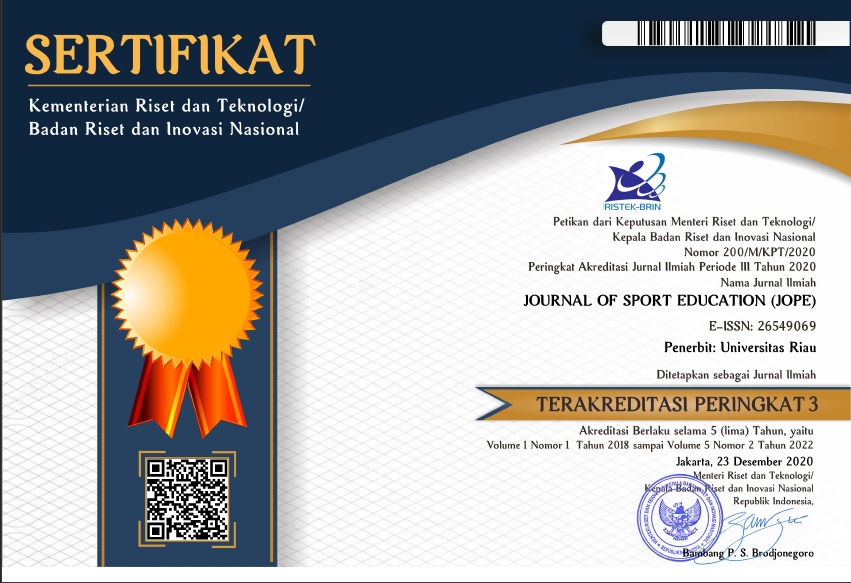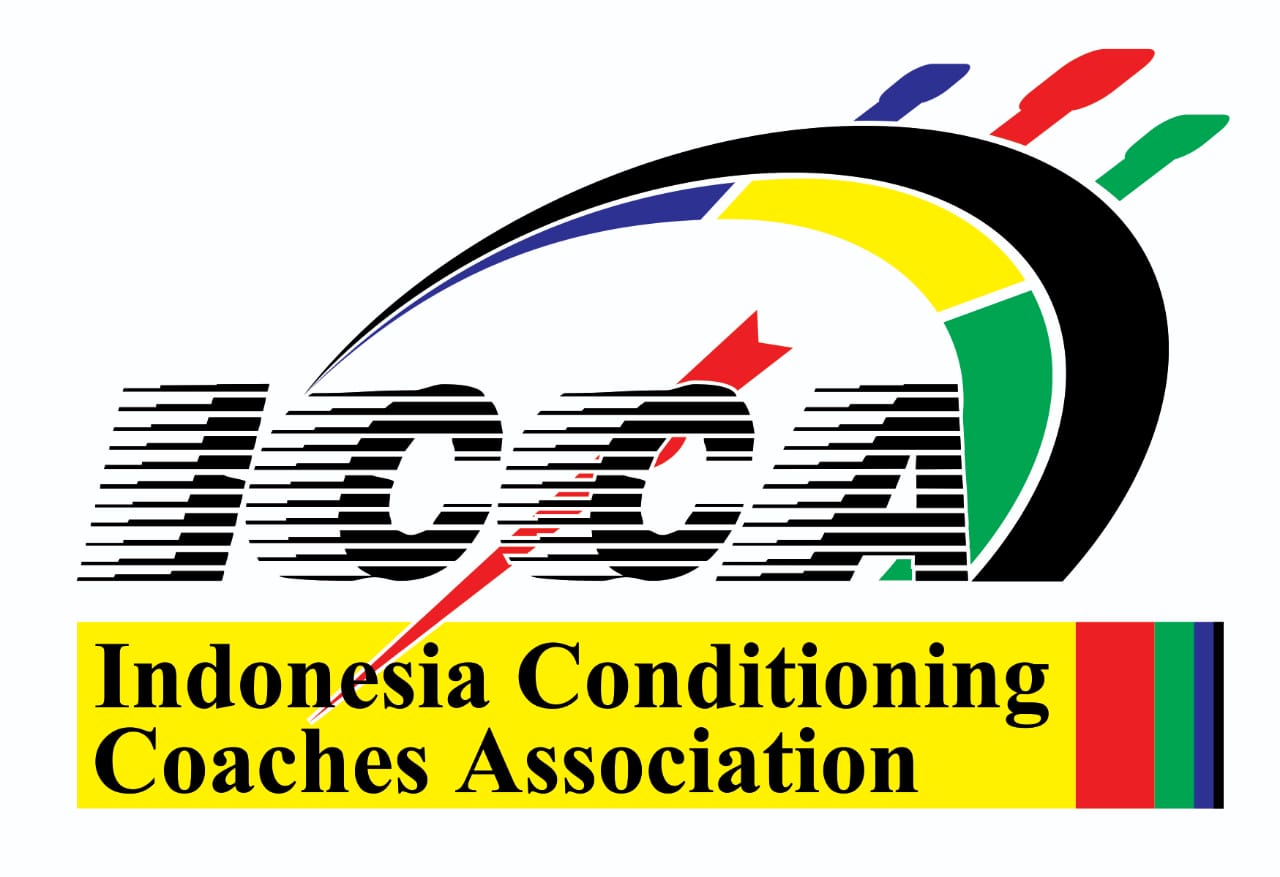Perbedaan pengaruh pemberian dosis kafein terhadap hockey skill performance pada atlet hoki saat kondisi lelah
Abstract
Penelitian ini bertujuan untuk mengetahui perbedaan pengaruh pemberian dosis kafein terhadap hockey skill performance pada atlet hoki saat kondisi lelah. Metode eksperimen dengan desain repeated measure dilakukan terhadap 10 atlet putra UKM Hoki UPI. Instrumen yang digunakan untuk mengukur hockey skill performance terdiri dari dua, yaitu Hockey Slalom Sprint Dribble Test dan Chapman Ball Handling Test. Perlakuan berupa pemberian kafein dosis rendah, dosis tinggi dan placebo serta latihan hoki diberikan kepada sampel. Uji ANOVA digunakan dalam penelitian ini. Penulis dapat menyimpulkan bahwa terdapat perbedaan pengaruh yang signifikan pemberian kafein dosis rendah, dosis tinggi, dan placebo terhadap hockey skill performance pada atlet hoki saat kondisi lelah. Ketiga perlakuan tersebut memberikan pengaruh yang berbeda-beda, namun kafein dosis rendah dengan placebo dapat dinyatakan memberikan pengaruh yang serupa. Selain itu juga, kafein dosis tinggi memberikan pengaruh yang lebih baik dari pada kafein dosis rendah dan placebo terhadap hockey skill performance pada atlet hoki saat kondisi lelah.
Copyright © The Author (s) 2022

Keywords
Full Text:
PDF (Bahasa Indonesia)References
Astorino, T. A. and D. W. R. (2010). E a c i s -t h -i e p a s r. Efficacy of Acute Caffeine Ingestion for Short-Term High Intensity Exercise Performance : Assystematic Review, 24(1), 257–265.
B. Sokmen, L.E. Armstrong, W.J. Kraemer, D.J. Casa, J.C. Dias, D.A. Judelson, C. M. M. (2008). C Affeine U Se in S Ports : C Onsiderations. The Journal of Strength Conditioning Research, 22(63), 978.
Bellar, D. M., Kamimori, G., Judge, L., Barkley, J. E., Ryan, E. J., Muller, M., & Glickman, E. L. (2012). Effects of low-dose caffeine supplementation on early morning performance in the standing shot put throw. European Journal of Sport Science, 12(1), 57–61. https://doi.org/10.1080/17461391.2010.536585
Caska, T. J., & Molesworth, B. R. C. (2007). The effects of low dose caffeine on pilot performance. International Journal of Applied Aviation Studies, 7(2), 244–255.
Chester, N., & Wojek, N. (2008). Caffeine consumption amongst British athletes following changes to the 2004 WADA Prohibited List. International Journal of Sports Medicine, 29(6), 524–528. https://doi.org/10.1055/s-2007-989231
Cordery, P., Funnell, M. P., Mears, S. A., & James, L. J. (2019). Chronic ingestion of a low dose of caffeine induces tolerance to the performance benefits of caffeine [Loughborough University]. https://doi.org/10.1080/02640414.2016.1241421
Creswell, john w. (2008). Educational Research (4 th).
Davis, J. K., & Green, J. M. (2009). Caffeine and anaerobic performance: Ergogenic value and mechanisms of action. Sports Medicine, 39(10), 813–832. https://doi.org/10.2165/11317770-000000000-00000
Duncan, M. J., Taylor, S., & Lyons, M. (2012). The effect of caffeine ingestion on field hockey skill performance following physical fatigue. Research in Sports Medicine, 20(1), 25–36. https://doi.org/10.1080/15438627.2012.634686
Filip-Stachnik, A., Wilk, M., Krzysztofik, M., Filip, A., Zajac, A., & Del Coso, J. (2021). The effects of high doses of caffeine on maximal strength and muscular endurance in athletes habituated to caffeine. Journal of the International Society of Sports Nutrition, 18(25), 1–10. https://doi.org/10.1186/s12970-021-00421-9
Fraenkel, J. R., Wallen, N. E., & Hyun, H. H. (2012). How to Design and Evaluate Research in Education (8th Ed.). Mc Graw Hill.
Gant, N., Ali, A., & Foskett, A. (2010). The influence of caffeine and carbohydrate coingestion on simulated soccer performance. International Journal of Sport Nutrition and Exercise Metabolism, 20(3), 191–197. https://doi.org/10.1123/ijsnem.20.3.191
Graham, T. E. (2001). Caffeine and exercise: metabolism, endurance and performance. / Cafeine et exercice: metabolisme, endurance et performance. Sports Medicine, 31(11), 785–807.
Graham, T. E., & Spriet, L. L. (1995). Responses To Various Doses of Caffeine and Exercise Responses To Various Doses of Caffeine. Journal of Applied Physiology, 1370765, 867–874.
Henrix, C.R.; Housh, T.J.; Mielke, M.; Zuniga, J. M. ., & Camic, C.L.; Johnson, G.O.; Housh, D. J. (2010). Acute effects of a caffeine-containing supplement on bench press and leg extension strength and time to exhaustion during cycle ergometry. 24(3), 859–865.
Hodgson, A. B., Randell, R. K., & Jeukendrup, A. E. (2013). The Metabolic and Performance Effects of Caffeine Compared to Coffee during Endurance Exercise. PLoS ONE, 8(4). https://doi.org/10.1371/journal.pone.0059561
Hogervorst, E., Bandelow, S., Schmitt, J., Jentjens, R., Oliveira, M., Allgrove, J., Carter, T., & Gleeson, M. (2008). Caffeine improves physical and cognitive performance during exhaustive exercise. Medicine and Science in Sports and Exercise, 40(10), 1841–1851. https://doi.org/10.1249/MSS.0b013e31817bb8b7
Karayigit, R., Yildiz, H., Sahin, M. A., Sisman, A., Sari, C., Ersözs, G., & Ersöz, G. (2021). The effects of low-dose caffeinated coffee ingestion on strength and muscular endurance performance in male athletes. Progress in Nutrition, 23(1), 1–8. https://doi.org/10.23751/pn.v23i1.9067
Lyons, M., Al-Nakeeb, Y., & Nevill, A. (2006). The impact of moderate and high intensity total body fatigue on passing accuracy in expert and novice basketball players. Journal of Sports Science & Medicine, 5(2), 215–227.
McLellan, T. M., Caldwell, J. A., & Lieberman, H. R. (2016). A review of caffeine’s effects on cognitive, physical and occupational performance. Neuroscience and Biobehavioral Reviews, 71, 294–312. https://doi.org/10.1016/j.neubiorev.2016.09.001
Papapanagiotou, A., Gissis, I., Papadopoulos, C., Souglis, A., Bogdanis, G. C., Giosos, I., & Sotiropoulos, A. (2011). Changes in homocysteine and 8-iso-PGF2a levels in football and hockey players after a match. Research in Sports Medicine, 19(2), 118–128. https://doi.org/10.1080/15438627.2011.556532
Puente, C., Abián-Vicén, J., Salinero, J. J., Lara, B., Areces, F., & Del Coso, J. (2017). Caffeine improves basketball performance in experienced basketball players. Nutrients, 9(9), 1–13. https://doi.org/10.3390/nu9091033
Reuter, S. E., Schultz, H. B., Ward, M. B., Grant, C. L., Paech, G. M., Banks, S., & Evans, A. M. (2021). The effect of high-dose, short-term caffeine intake on the renal clearance of calcium, sodium and creatinine in healthy adults. British Journal of Clinical Pharmacology, December 2020, 1–6. https://doi.org/10.1111/bcp.14856
Salinero, J. J., Lara, B., & Del Coso, J. (2019). Effects of acute ingestion of caffeine on team sports performance: a systematic review and meta-analysis. Research in Sports Medicine, 27(2), 238–256. https://doi.org/10.1080/15438627.2018.1552146
Santoso, S. (2017). Complete Guide to Mastering Statistics with SPSS 24. PT. Elex Media Komputindo.
Spriet, L. L. (2014). Exercise and Sport Performance with Low Doses of Caffeine. Sports Medicine, 44(Suppl 2), 175–184. https://doi.org/10.1007/s40279-014-0257-8
Tan, Z. S., Burns, S. F., Pan, J. W., & Kong, P. W. (2020). Effect of caffeine ingestion on free-throw performance in college basketball players. Journal of Exercise Science and Fitness, 18(2), 62–67. https://doi.org/10.1016/j.jesf.2019.12.002
Temple, J. L., Bernard, C., Lipshultz, S. E., Czachor, J. D., Westphal, J. A., & Mestre, M. A. (2017). The Safety of Ingested Caffeine: A Comprehensive Review. Frontiers in Psychiatry, 8(May), 1–19. https://doi.org/10.3389/fpsyt.2017.00080
Temple, J. L., Dewey, A. M., & Briatico, L. N. (2010). Effects of Acute Caffeine Administration on Adolescents. Experimental and Clinical Psychopharmacology, 18(6), 510–520. https://doi.org/10.1037/a0021651
W. Larry Kenney, Jack H. Wilmore, D. L. C. (2011). Physiology of Sport and Exercise. In Physiology of sport and exercise (Vol. 438). https://doi.org/10.1007/978-981-10-0767-5_35
Woolf, K., Bidwell, W. K., & Carlson, A. G. (2008). The effect of caffeine as an ergogenic aid in anaerobic exercise. International Journal of Sport Nutrition and Exercise Metabolism, 18(4), 412–429. https://doi.org/10.1123/ijsnem.18.4.412
Zheng, X., Takatsu, S., Wang, H., & Hasegawa, H. (2014). Acute intraperitoneal injection of caffeine improves endurance exercise performance in association with increasing brain dopamine release during exercise. Pharmacology Biochemistry and Behavior, 122, 136–143. https://doi.org/10.1016/j.pbb.2014.03.027
Zuchinali, P., Souza, G. C., Pimentel, M., Chemello, D., Zimerman, A., Giaretta, V., Salamoni, J., Fracasso, B., Zimerman, L. I., & Rohde, L. E. (2016). Short-term effects of high-dose caffeine on cardiac arrhythmias in patients with heart failure: A randomized clinical trial. JAMA Internal Medicine, 176(12), 1752–1759. https://doi.org/10.1001/jamainternmed.2016.6374
DOI: http://dx.doi.org/10.31258/jope.4.2.97-109
Refbacks
- There are currently no refbacks.












